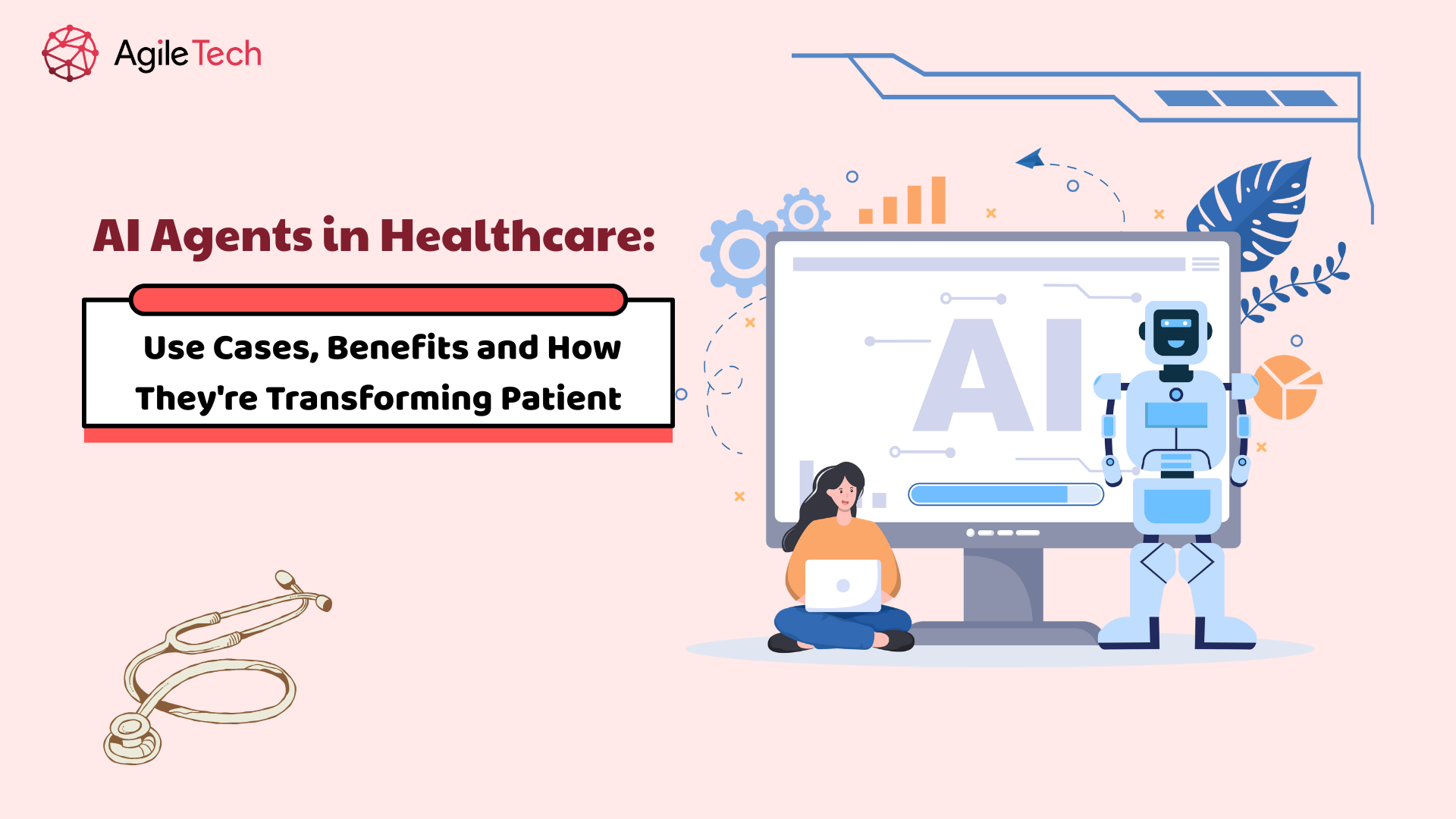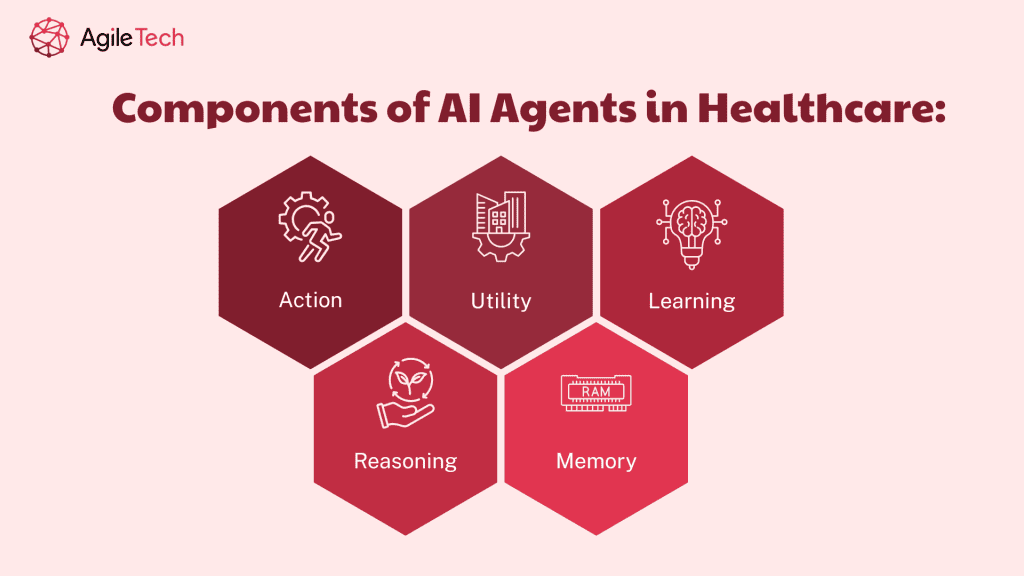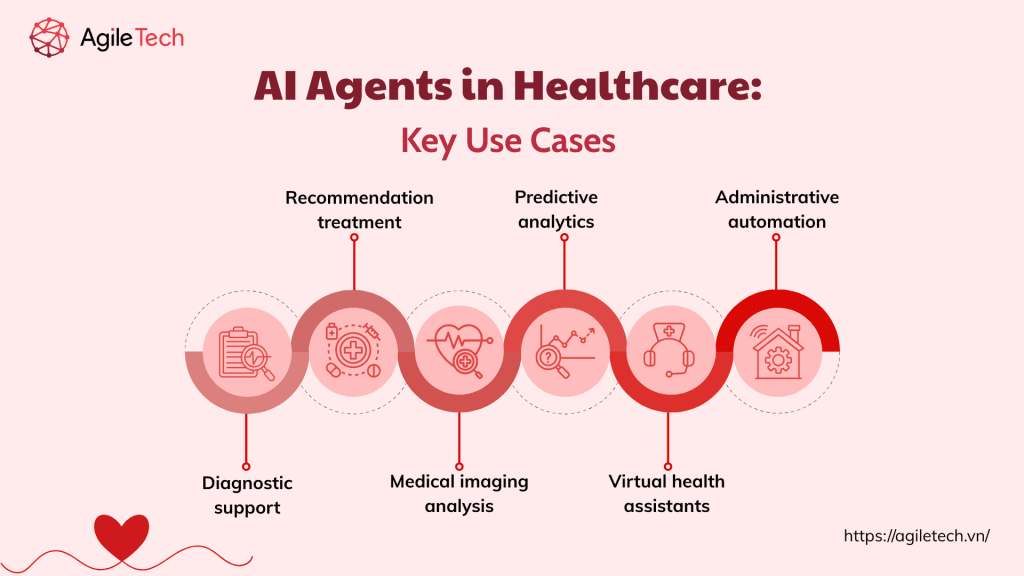AI Agents in Healthcare: Use Cases, Benefits and How They’re Transforming Patient
AI agents in healthcare are revolutionizing how medical professionals diagnose, treat, and care for patients. By leveraging machine learning, natural language processing, and automation, these intelligent systems analyze large volumes of medical data, support clinical decisions, and personalize patient care. From optimizing hospital workflows to predicting health outcomes, AI agents are driving efficiency and precision in modern medicine, making them a key force in the future of healthcare innovation.

- What is an AI Agent?
- How AI Agents Are Transforming Healthcare?
- Components of AI Agents in Healthcare
- Key Benefits of Applying AI Agents in Healthcare
- Key Use Cases of AI Agents in Healthcare
- Common Challenges of AI Agents in Healthcare
- The Relationship Between AI Agents and the Agentic AI Trends 2025
- AgileTech – Your Trusted Partner for AI Agents in healthcare
- Conclusion
What is an AI Agent?
In simple terms, AI agents in healthcare are intelligent systems powered by artificial intelligence that can perform tasks independently — from collecting patient data and analyzing medical records to assisting doctors in clinical decisions. These agents are built on advanced technologies like large language models (LLMs) and retrieval-augmented generation (RAG), enabling them to understand natural language, search through vast medical databases and continuously learn from new information.
Unlike traditional software or static AI models, AI agents are designed to act autonomously, adapt to changing contexts, and coordinate multiple digital tools within hospital systems. For example, an AI agent can interpret a doctor’s instructions, retrieve relevant patient history, analyze lab results, and suggest treatment options in real time.
By connecting and automating complex workflows, AI agents in healthcare reduce administrative tasks, enhance diagnostic accuracy, and empower medical professionals to focus more on patient care. In essence, they represent a major step toward smarter, more efficient, and data-driven healthcare delivery.
How AI Agents Are Transforming Healthcare?
Modern healthcare is shifting to AI agents — intelligent assistants that collaborate to improve efficiency, accuracy, and patient outcomes. Each agent handles specific tasks like managing appointments, assisting patients or summarizing consultations. By integrating data from sources such as EHRs and medical databases, these agents identify trends and provide insights that support smarter clinical decisions.
- Define clear objectives: Align the system’s goals with the organization’s overall strategy, ensuring agents prioritize the most high-impact actions.
- Train on internal and external data: Allow agents to understand real-world contexts and transform raw data into actionable insights.
- Coordinate intelligent task execution: Agents work collaboratively, distribute tasks, and self-monitor outcomes to maintain accuracy while adjusting workflows based on feedback from medical experts.
- Continuous evaluation and improvement: The system compares real-world results with initial objectives, learns from outcomes, and updates its knowledge base to continually optimize performance.
Components of AI Agents in Healthcare
To understand how AI agents in healthcare work, we must look at the key components that make up their intelligence. These systems include interconnected modules that sense, think, act, and learn continuously. Each part handles tasks like collecting patient data, analyzing it, reasoning, and improving through experience, allowing AI to provide accurate recommendations and adapt to complex healthcare environments.

- Perception: AI agents in healthcare can “see” and “listen” through visual and audio inputs. They capture conversations, analyze medical imagery, or process patient vitals, then convert raw data into structured formats ready for clinical use in Electronic Health Records (EHRs).
- Action: Based on analyzed data, the agent can summarize consultations, generate follow-up reminders, or suggest diagnostic directions. Some even communicate directly with patients, supporting them remotely through chat or wearable integrations.
- Utility: This module continuously evaluates performance — measuring diagnostic accuracy, user satisfaction, and treatment outcomes — ensuring each action aligns with clinical objectives.
- Learning: Through feedback from doctors and real-world outcomes, AI agents adapt and refine their responses. Every correction strengthens future recommendations, turning experience into evolving intelligence.
- Reasoning: By combining stored medical knowledge with live data, AI agents can recognize health risks early and recommend evidence-based treatment options.
- Memory: Acting as a dynamic knowledge base, it stores all interactions, insights, and outcomes — enabling personalized, context-aware care delivery.
Together, these components allow AI agents in healthcare to operate as cohesive, self-improving systems — continuously learning, reasoning, and acting to deliver safer, smarter, and more human-centered care.
Key Benefits of Applying AI Agents in Healthcare
Before examining their practical benefits, it’s important to understand why AI agents have become essential in modern medicine. They go beyond automation by assisting doctors, nurses, and administrators throughout the entire patient care process. Through natural language processing, predictive analytics, and real-time data integration, AI enhances speed, accuracy, and personalization in healthcare services, while transforming care delivery and reshaping patient-centered medicine.
Supporting Doctors & Medical Staff
AI agents in healthcare significantly reduce the administrative burden on medical teams. Instead of spending hours manually entering data or compiling patient information, AI agents can automatically record, transcribe, and summarize medical consultations. Before meeting a patient, doctors receive a concise overview of their medical history, previous diagnoses, and relevant test results — giving them a comprehensive understanding within seconds.
Medical staff also benefit from AI assistance in record preparation, appointment scheduling, and test management, allowing them to devote more time to patient care.
Reducing Costs & Increasing Operational Efficiency
In hospital management, AI agents optimize processes such as coding, billing, and administrative workflows. They can detect errors in ICD codes, reconcile costs, and automate insurance verification. This not only reduces operational expenses but also accelerates document processing, minimizes data discrepancies, and enhances the accuracy of medical billing.
Enhancing Diagnosis & Personalizing Treatment
AI agents have the capability to analyze multi-source data — from electronic health records (EHRs) and medical imaging to lab results and clinical research. By identifying complex patterns and correlations that are difficult for humans to detect, these systems enable faster diagnosis and more personalized treatment plans for each patient. This is especially valuable in managing chronic diseases or cancer, where large volumes of data must be processed accurately and in real time.
Real-Time Monitoring & Remote Support
AI agents in healthcare can connect directly to wearable devices or IoT-based medical systems to monitor vital signs such as heart rate, blood pressure, and oxygen saturation. When irregularities are detected, the system immediately sends alerts to doctors or caregivers, enabling early intervention. This capability enhances the safety and effectiveness of remote patient care, particularly for elderly or chronically ill individuals.
Administrative Automation & Patient Management
Beyond clinical applications, AI agents also automate various administrative tasks such as patient check-in, appointment scheduling, responding to frequently asked questions, and sending follow-up reminders. These seemingly small functions collectively reduce staff workload, shorten patient wait times, and enhance the overall patient experience.
Explore more: Revolutionary Blockchain in Healthcare: Key Benefits and Real-World Case Studies[Updated 2025]
Key Use Cases of AI Agents in Healthcare
AI agents in healthcare are ushering in a new era of medical care — one where technology not only supports humans but also acts as an “intelligent assistant” that enhances diagnostic accuracy, treatment effectiveness, and healthcare management efficiency. Below are some of the most prominent real-world applications currently being implemented by leading hospitals and healthcare organizations around the world.

Diagnostic Support – Enhancing Diagnostic Accuracy
AI agents can analyze millions of medical data points — from lab results to patient records — to assist doctors in identifying root causes and suggesting appropriate treatment options. This helps minimize diagnostic errors and shortens the time required for clinical decision-making. Recommendation Treatment – Personalized Care Plans
Recommendation Treatment – Personalized Care Plans
AI agents in healthcare recommend optimized treatment plans tailored to each patient, based on their genetic profile, medical history, and medication responses. As a result, therapies become more effective and better suited to individual needs.
Medical Imaging Analysis – Advanced Image Interpretation
Through deep learning capabilities, AI agents can detect early abnormalities in X-rays, CT scans, or MRIs — such as signs of cancer, tissue damage, or fractures — with high precision, supporting physicians in making faster and more accurate diagnoses.
Predictive Analytics – Anticipating Health Risks & Trends
By leveraging big data analytics, AI agents can predict disease recurrence or potential complications, enabling hospitals to take proactive measures in monitoring and prevention.
Virtual Health Assistants & Administrative Automation
Virtual health assistants help patients schedule appointments, track treatment progress and receive remote consultations. Meanwhile, administrative automation streamlines hospital workflows — from registration and billing to record management — improving efficiency and reducing workload.
These use cases demonstrate that AI agents in healthcare are not just a passing trend but a practical solution that is gradually transforming the entire healthcare experience — making it smarter, faster, and more efficient.
Although AI agents in healthcare are driving breakthroughs in medical support, diagnostic efficiency and patient management, their real-world implementation still faces significant challenges.
Common Challenges of AI Agents in Healthcare
Regulations and Data Privacy (HIPAA, GDPR):
Healthcare data is among the most sensitive types of information. Therefore, deploying AI agents requires strict compliance with international standards such as HIPAA (U.S.) and GDPR (Europe). Healthcare organizations must ensure that all data is encrypted, securely stored and properly processed to prevent patient information leaks — which could directly impact trust and reputation.
Complex Integration with Existing Systems (EHR, ERP):
AI agents in healthcare often need to integrate with hospital management systems such as Electronic Health Records (EHR) or Enterprise Resource Planning (ERP). However, differences in platforms, interfaces and data structures make this integration process complex and time-consuming. Successful implementation requires a flexible technology strategy and an experienced technical team.
Reliability and Risk of Errors:
Despite their ability to learn autonomously, AI agents still require human oversight, especially in complex clinical scenarios. Even a minor analytical or diagnostic error can lead to serious consequences. Therefore, physicians remain central to validating and approving the system’s recommendations.
High Development & Data Training Costs:
Building a comprehensive AI healthcare system demands substantial investment in infrastructure, data quality, and security. Moreover, collecting and cleaning high-quality medical data is one of the greatest challenges, as patient information is often fragmented, inconsistent, or difficult to access.
Read more: How Much Is the Cost of Implementing AI in Healthcare?
The Relationship Between AI Agents and the Agentic AI Trends 2025
AI Agents represent an important intermediate step on the journey toward Agentic AI — the next generation of autonomous artificial intelligence capable of reasoning, decision-making, and taking independent actions to achieve specific goals.
While current AI agents in healthcare or enterprises primarily perform predefined tasks such as data aggregation, diagnostic support, or user interaction, Agentic AI 2025 elevates these capabilities to a higher level — enabling systems to self-learn, self-adjust, and collaborate with other agents without human intervention.
The evolution of AI agents forms the foundation for the Agentic AI 2025 trend. Technologies such as Large Language Models (LLMs), Retrieval-Augmented Generation (RAG), and multi-agent systems are empowering AI not only to react but also to proactively plan, predict, and optimize actions in real time. This transformation shifts AI from being merely a supporting tool to becoming an intelligent partner that collaborates with humans to solve complex problems.
In the healthcare sector, this connection is particularly evident. Current AI agents in healthcare — such as virtual clinical assistants or diagnostic support systems — are gradually evolving toward the Agentic AI model, where agents can autonomously coordinate, learn from patient data, and continuously optimize treatment processes over time.
AgileTech – Your Trusted Partner for AI Agents in healthcare
With more than 10 years of experience in software development, AgileTech has successfully delivered numerous projects across various industries, helping businesses operate smarter, faster and more efficiently. Our team specializes in developing intelligent systems that can listen, learn and act — taking automation and decision-making to the next level.
From AI agents in healthcare that assist doctors with data-driven diagnostics to enterprise-level intelligent automation platforms that streamline workflows and enhance customer interactions, AgileTech customizes every solution to meet your organization’s specific needs. Contact us today to start your digital transformation journey.
Conclusion
The rise of AI Agents marks a transformative shift in how businesses and healthcare organizations operate — moving from static automation toward dynamic, intelligent ecosystems that think, adapt, and evolve. These agents are not just tools but digital collaborators capable of learning from data, understanding context, and delivering personalized insights in real time.
At AgileTech, we believe the future belongs to organizations that can harness the full potential of AI agent solutions to boost efficiency, improve decision-making, and elevate customer experiences. With over ten years of proven expertise in AI, data engineering, and software development, AgileTech is committed to helping businesses integrate AI Agents seamlessly into their existing systems.
As industries continue to embrace intelligent automation, partnering with a trusted technology provider like AgileTech ensures that innovation is not only achieved but sustained — empowering enterprises to stay ahead of the curve in the era of digital intelligence
